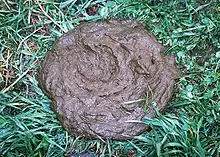Aqua omnium florum
Aqua omnium florum or all-flower water was water distilled from cow-dung in May, when the cows ate fresh grass with meadow flowers. It was also known less euphemistically as aqua stercoris vaccini stillatitia (distilled water of cow dung).[1] This was used as a medicine to treat a variety of ailments including gout, rheumatism and tuberculosis.[2][3]

The 17th century court physician George Bate favoured it and it appeared in the Pharmacopœia Bateana — Bate's Dispensatory.[4] Recipes included:[2]
cow dung, gathered in May, adding to it a third of white wine and then distilled
fresh cow-dung and snails with their shells bruised equal parts, mix and distill in a common still
Rx Fresh cow dung gathered in the morning; spring or rain water; mix and digest twenty-four hours, let it settle, and then decant the clear brown tincture.
The latter prescription was used as a panacea by a female doctor in Bate's time. Many incurable cases were brought to her which she treated in this way and she made a great fortune of £20,000 from this practice.[2]
Urina vaccina
Cow tea or urina vaccina (cow's urine) was sometimes called aqua omnium florum too.[1] This was used as a purgative for which the dosage would be "half a pint drank warm from the cow".[5] It was drunk by women in May to clear their complexion.[1]
Indian traditional medicine
Cow dung, urine and other bovine products are still used extensively in the traditional Hindu medicine, Ayurveda.[6]
References
- Charles Alston (1770), Lectures on the Materia Medica, vol. 2, Edward Dilly, p. 551
- T. Laycock (1858), "On the New Pharmacopœia", The Pharmaceutical Journal and Transactions, XVIII: 312–313
- Samuel Frederick Gray (1821), A Supplement to the Pharmacopœia, Thomas and George Underwood, p. 310
- Saint Bartholomew's Hospital Reports, 1884, p. 299
- Samuel Frederick Gray (1836), "Animal Secretions and Excretions", A Supplement to the Pharmacopœia and Treatise on Pharmacology in General (6th ed.), Longman, Rees, Orme, Brown, Green, and Longman, p. 179
- Rahul Bedi (16 Mar 2005), "Cow dung becomes a cure-all in India", Daily Telegraph